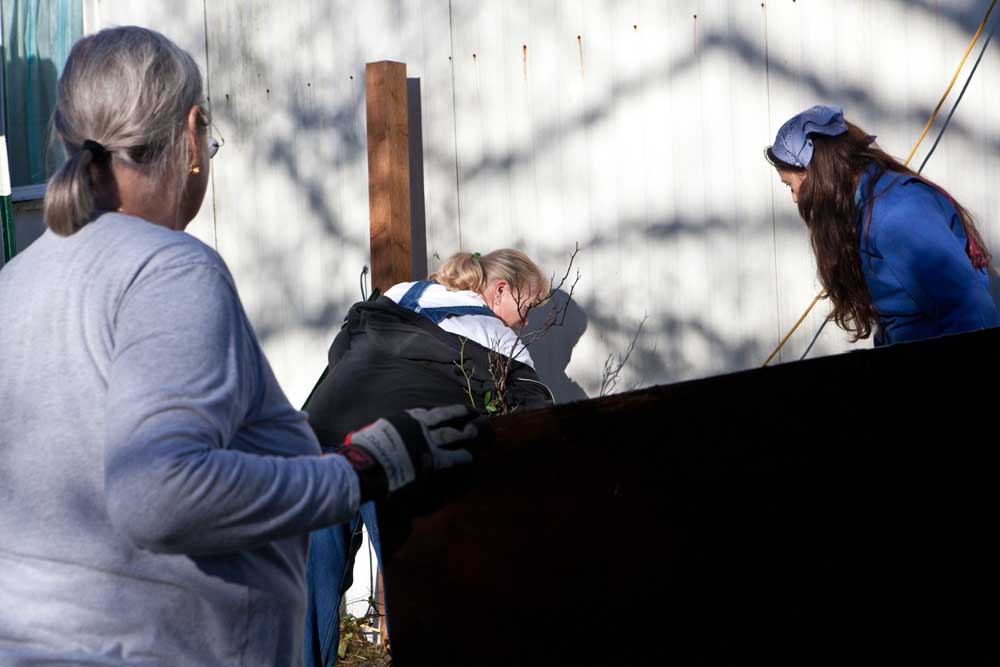Lives without chains
Published 3:12 am Friday, December 19, 2014

- Volunteers Vicki Hood, Sharie Jones and Jennifer Adams use a piece of plywood to cover up a potential hazard before installing a new fence for Snuggles, a husky who spent much of her time on a chain.
LONG BEACH PENINSULA, Wash. — For dogs who spend their lives on chains, a few hours, a few volunteers and a few hardware store supplies can make all the difference in the world.
Saturday morning, volunteers for the nonprofit, all-volunteer group Fences For Fido gave several peninsula dogs (and their owners) a life-changing gift: freedom of movement and a safe place to play. Over the course of a few hours, a group of about 20 local and Portland-area volunteers constructed dog-proof fences at two north peninsula homes where the dogs had previously spent much of their time on chains.
Founded in 2009, the Portland-based charity is dedicated to providing free fences and simple beds and shelters to dog-owners who cannot provide safe conditions for their pets. The uniquely dedicated FFF volunteers serve pet-owners just about anywhere within a two- of three-hour radius of Portland, and build six to eight new fences every month. In all, their work has benefited about 800 dogs, according to the FFF website.
On Saturday morning, two 8-month old puppies, Bagheera and Baloo, strained at cable tethers as they watched an enthusiastic group of volunteers install a brand-new fence around Taylor Delauney’s yard in Surfside.
The close-knit group of volunteers have perfected their fence-building technique over many similar projects. They worked so quickly that Delauney wasn’t sure how to contribute to the effort.
“I help where I can!” Delauney laughed.
Dealuney said he and his kids, Tayten, 7, and Tucker, 8, adopted the husky-wolf-mix sisters several months ago when a family friend unexpectedly found himself caring for a huge litter of orphaned puppies. The sweet, rambunctious white puppies are clearly well-loved, but without a fence, it’s been hard for the family to give them enough exercise and playtime.
“We couldn’t have afforded this right now,” an appreciative Delauney said. His children said they were looking forward to finally being able to cavort and wrestle with Bagheera and Baloo.
“It will be better because they can run,” Tayten said. “We’ll be able to play chase!”
Bagheera and Baloo won’t just have more fun — they’ll also lead healthier lives and make safer companions after being freed from their tethers. Chains tangle easily, restricting the dogs’ freedom of movement, and in some cases causing injury or strangulation. Dogs are social animals — they need interaction and exercise to thrive. Dogs who spend too much time in confinement are more likely to be aggressive or depressed. They also pose a threat to humans — The Center for Disease Control found that tethered dogs are nearly three times as likely to bite as unchained dogs.
While one group of volunteers assembled Delauney’s fence, a second party of volunteers unloaded a carefully organized store of supplies in the yard of a singlewide manufactured home in Ocean Park. The group’s petite, energetic volunteer coordinator, Jennifer Adams, surveyed the yard, looking for any hazards that could hurt the owner’s dog, a beautiful grey husky mix named Snuggles, and asked her teammates to help her cover a hole in the home’s metal siding.
Volunteers who sunk posts on a previous visit had observed that Snuggles’ rusted metal chain was “very, very tangled,” Adams said.
In healthy conditions, dogs don’t sleep in the same place where they go to the bathroom, but Snuggles had little choice but to relieve herself in the same patch of yard where she spent most of her life.
Because she’d had little human interaction, Snuggles was too frightened to stay outside while the volunteers worked, so she stayed inside with her owners. Volunteers said the fence would likely benefit other dogs, too — they estimated that Snuggles’ owners had about four large dogs, and 10-15 toy dogs inside the home.
There are lots of reasons why people keep their pets on chains, the volunteers said. It’s true that some people are abusive to their pets, or simply don’t care if the animals suffer. But more often, people who genuinely love their pets just don’t understand that it’s harmful, or don’t have the means to improve the animals’ conditions.
In an interview on her porch, Snuggles’ owner said she’d taken the dog in when a relative had to move to pet-free housing. She and her disabled father had struggled to meet the dog’s needs. She said she understood that it wasn’t good for Snuggles, but didn’t know what to do about it until FFF volunteers contacted her.
Lori Chambers, a volunteer from West Linn, Ore. said Snuggles’ new fence was her 50th “build.” Like a lot of her teammates, Chambers says FFF has proven to be a great way to make like-minded friends — in fact, some of the volunteers laughing described themselves as a “family.”
On her first build, she saw her fellow volunteers go into “turbo mode” to help an abandoned dog they encountered along the way
“I was like, ‘I don’t know these people, but I love them!’” Chambers said.
In addition to building fences, the volunteers help with fundraising events, have shelter and bed-making parties, and sometimes transport animals to spay and neuter clinics, or help to find new homes for animals whose owners wish to relinquish them.
Whatever a dogs’ conditions, FFF volunteers make a commitment to be sensitive and respectful to the pet-owners. Chambers said that when she was a new volunteer, she worried that she wouldn’t be able to handle the emotional toll of seeing abused or neglected dogs.
“I was worried that if they saw me cry, they would feel that as a form of judgment. But what I learned is that we cry whether we’re sad or happy — it doesn’t really matter!” Chambers said.
She acknowledged that some volunteers do find animals in heart-wrenching situations. For example, one job involved a dog that lost a leg when it was allowed to wander onto train tracks near the home, and was never taken to see a vet. But Chambers said that once she experienced the joy of seeing a dog set free for the first time, she decided the good parts of the experience more than made up for the occasional distress.
“No matter what the situation is, by the time we leave, it’s always better,” Chambers said. “Their lives are going to be forever better.”
Info box
Fences For Fido is actively seeking volunteers in Pacific County.
You don’t have to have construction skills to help out — there are plenty of opportunities for people who want to help with marketing, fundraising, making beds and shelters, delivering products, fostering dogs and doing follow-up visits.
For more information, call 503-621-9225, email volunteer@fencesforfido.org, join FFF’s SW Washington Region group on Facebook.
To donate or find volunteer application materials, please visit the FFF website. www.fencesforfido.org





